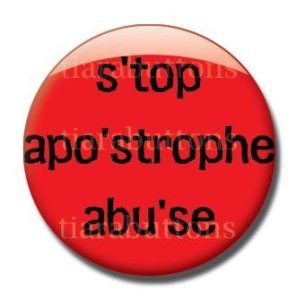Navigation
Install the app
How to install the app on iOS
Follow along with the video below to see how to install our site as a web app on your home screen.
Note: This feature may not be available in some browsers.
More options
Style variation
You are using an out of date browser. It may not display this or other websites correctly.
You should upgrade or use an alternative browser.
You should upgrade or use an alternative browser.
SCOTUS reverses lower court on firearm pocession
- Thread starter xerts1191
- Start date
It all started with apostrophes.
It went downhill from there.
The abuse and overuse of the humble apostrophe has driven me to near madness.
It seems fashionable for keyboard commandos to add an apostrophe when a simple "S" will suffice.
Oh, the horror. I feel unappreciated in my efforts. Oh Lord, won't you buy me a Mercedes Benz. My friends all drive Porsches, I must make amends.
It went downhill from there.
The abuse and overuse of the humble apostrophe has driven me to near madness.
It seems fashionable for keyboard commandos to add an apostrophe when a simple "S" will suffice.
Oh, the horror. I feel unappreciated in my efforts. Oh Lord, won't you buy me a Mercedes Benz. My friends all drive Porsches, I must make amends.
FIFYbrian10x said:Oh Lord, won't you buy me a Mercede's Benz. My friend's all drive Porsche's, I must make amend's.
Ballistic Therapy
Member
Can I say
My gun's for killing ?
Or should I say " my gun is for killing ".
My gun's for killing ?
Or should I say " my gun is for killing ".
Well, because this thread, originally about a Supreme Court decision, has been irretrievably hijacked, I submit this offering from the master, Dave Barry:
https://www.miamiherald.com/living/liv-columns-blogs/dave-barry/article1936919.html
https://www.miamiherald.com/living/liv-columns-blogs/dave-barry/article1936919.html
Dear Mister Language Person: What is the purpose of the apostrophe?
A. The apostrophe is used mainly in hand-lettered small- business signs to alert the reader that an "S" is coming up at the end of a word, as in: WE DO NOT EXCEPT PERSONAL CHECK'S, or: NOT RESPONSIBLE FOR ANY ITEM'S. Another important grammar concept to bear in mind when creating hand-lettered small- business signs is that you should put quotation marks around random words for decoration, as in "TRY" OUR HOT DOG'S, or even TRY "OUR" HOT DOG'S.
Let’s circle back to the original—are there certain reasons not to restore gun rights? What if the person themselves did not commit a violent act, but sold a gun to a violent person? I know a guy that this has happened to him, and he will never be able to possess a weapon (guns, bow and arrows, knife, rock, etc, at least that is what he was told by the feds). Does this guy get a pass? The guy has had his voting rights restored but no weapons. Only way for him to get them is by presidential pardon.
https://firearmslaw.duke.edu/2020/10/amy-coney-barrett-on-guns/Lwstarks said:Let’s circle back to the original—are there certain reasons not to restore gun rights? What if the person themselves did not commit a violent act, but sold a gun to a violent person? I know a guy that this has happened to him, and he will never be able to possess a weapon (guns, bow and arrows, knife, rock, etc, at least that is what he was told by the feds). Does this guy get a pass? The guy has had his voting rights restored but no weapons. Only way for him to get them is by presidential pardon.
To your friend's unjust dilemma, Judge Amy Coney Barrett wrote (in dissent) that "felon" was not a sufficiently narrow category; that the standard should be "dangerousness."
Now if we can only get such a case before the Supreme Court...From this history, Judge Barrett concluded that legislatures had the power to disarm those who present a threat to public safety. They can make that decision on a class-wide basis and do not need to rely on individual determinations. And, significantly, legislatures “may do so based on present-day judgments about categories of people whose possession of guns would endanger the public safety.” But a legislature has to justify that designation. Where it burdens a core right permanently, as here, it has to meet a very stringent standard (akin to strict scrutiny). According to Judge Barrett, 922(g)(1) is not tailored to an interest in preventing gun violence because it reaches too far: “It includes everything from Kanter’s offense, mail fraud, to selling pigs without a license in Massachusetts, redeeming large quantities of out-of-state bottle deposits in Michigan, and countless other state and federal offenses.” She further rejected the government’s statistical evidence showing a link between nonviolent prior offenses and future violent crime (those treat the whole nonviolent category together) as well as specifically between mail-fraud convictions and future recidivism (that study didn’t demonstrate whether later crimes were violent). Thus, “[a]bsent evidence that Kanter would pose a risk to the public safety if he possessed a gun, the government[] cannot permanently deprive him of his right to keep and bear arms.”
Judge Barrett concluded her opinion with a swipe at how her colleagues—and those on other courts who had nearly always done the same—treated the Second Amendment. Echoing what has become a strong theme of Justice Thomas’s continual dissents from denial of certiorari in Second Amendment cases, Judge Barrett wrote that the majority (and, by extension, dozens of other judges) were treating the right to keep and bear arms as a “second-class right.”
It's something about he likes to touch himself, or wants to touch you, or something like that.Flash said:brian10x said:Touche'
Ce qui sert à toucher.
Why can't y'all speak United States for cryin' out loud?
If you're too dangerous to possess a weapon, then you're too dangerous to be let out.
You are either a citizen, or you are not. You either have the rights of a citizen, or you do not. There is no 3/5ths of a person anymore. That was settled in Grant v. Lee.
You are either a citizen, or you are not. You either have the rights of a citizen, or you do not. There is no 3/5ths of a person anymore. That was settled in Grant v. Lee.
Suck My Glock said:If you're too dangerous to possess a weapon, then you're too dangerous to be let out.
You are either a citizen, or you are not. You either have the rights of a citizen, or you do not. There is no 3/5ths of a person anymore. That was settled in Grant v. Lee.
Well said. I could not agree with you more.
Similar threads
- Replies
- 2
- Views
- 76
- Replies
- 0
- Views
- 48
- Replies
- 0
- Views
- 72
- Replies
- 0
- Views
- 34






